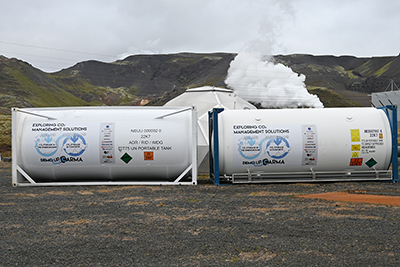News and events
- 2024-04-24
New DemoUp blog text on the interplay of pore network and flow

A new blog post written by Eleni Stavropoulou, a researcher at EPFL, illustrates findings from laboratory investigations conducted as part of the DemoUpStorage project. Her study focused on examining the mineral carbonation of basalt cores with varying porosity levels. By exposing these cores to CO2-rich seawater and developing numerical models to analyze their pore networks, Stavropoulou uncovered the significant role carbon mineralization has on flow properties of the basaltic material.
For further insights into the study, refer to the full blog post.
- 2024-04-03
The importance of pilot projects to tackle the climate crisis
 Read more...
Read more...In a recently published paper in Nature Chemical Engineering, Viola Becattini, Marco Mazzotti and Stefan Wiemer discuss the role of pilot projects such as DemoUpCARMA.
The project aimed at finding solutions to manage hard-to-abate and unavoidable CO2 emissions. By not only simulating this, but also effectively storing CO2 in Swiss concrete and Icelandic basalt, unique insights were gained. Among other things, the authors emphasise the importance of interdisciplinary collaboration, capacity and competence building, and the role of academia in driving climate solutions. The success of initiatives like DemoUpCARMA underscores the pivotal role of scientists in overcoming climate change. The idea of launching a scientists-led pilot project, small enough to be feasible but innovative enough to provide a step change in knowledge, engagement, and capacity creation, has been successful.
The paper is accessible via the following link: "Accelerating the climate transition through scientists-led CO2 management pilots"
- 2024-03-25
Final reports available now

The final reports of work packages 2, 4, 5 are available for download now.
Due to the ongoing CO2 injection in Iceland, the reports of work package 1 and 3 will be published at a later point of time. - 2023-12-06
What should be done with all the CO2?

Capturing CO2 from the atmosphere and storing it either in recycled concrete aggregate or in geological reservoirs in Iceland is not only technically feasible, but also has a positive carbon footprint. These are the findings of DemoUpCARMA, which were presented to the media in the morning and to an interested audience at ETH Zurich in the afternoon.
A summary of the project results and an article by ETH Zurich provide more detailed insights.
As the CO2 injection of Swiss CO2 in Iceland could only start in November 2023, and therefore later than expected, the project is not yet fully completed. CO2 injection and geophysical monitoring of the CO2 reservoir will continue as part of the partner project DemoUpStorage partner. Also, the CO2 transport from Switzerland to Iceland will continue.


